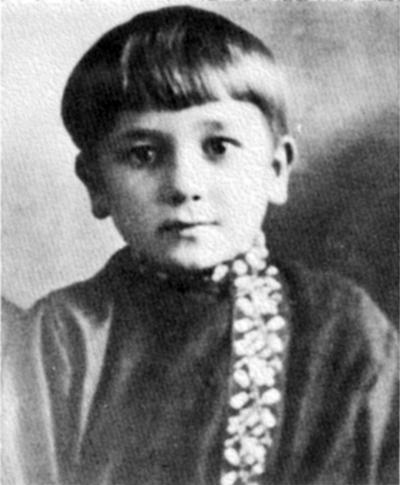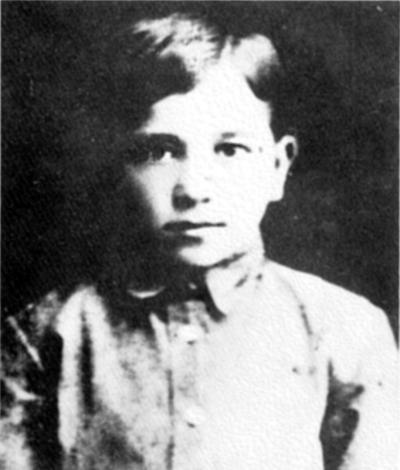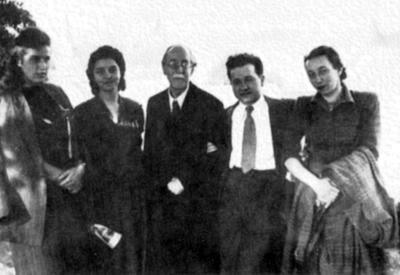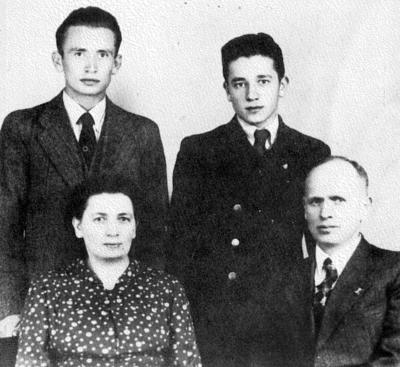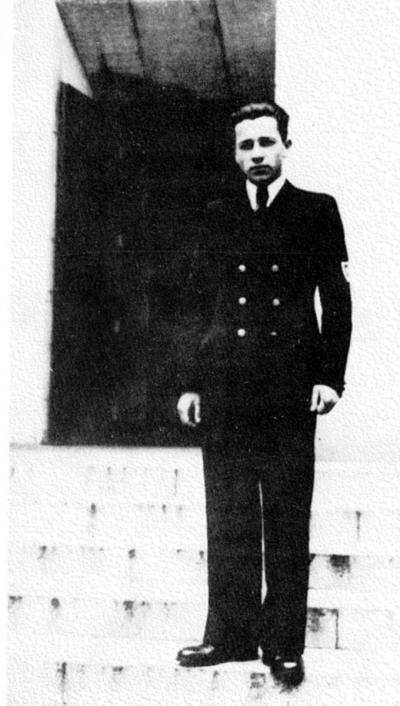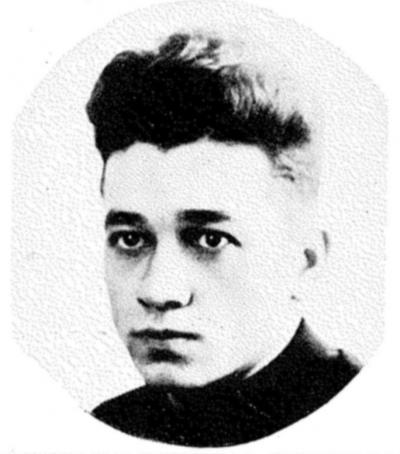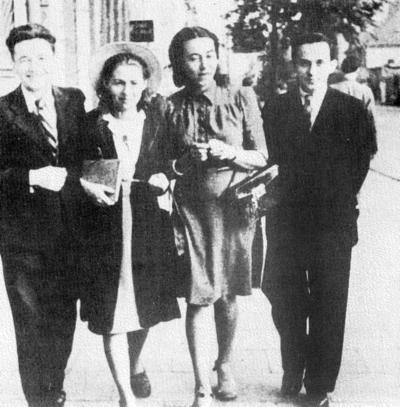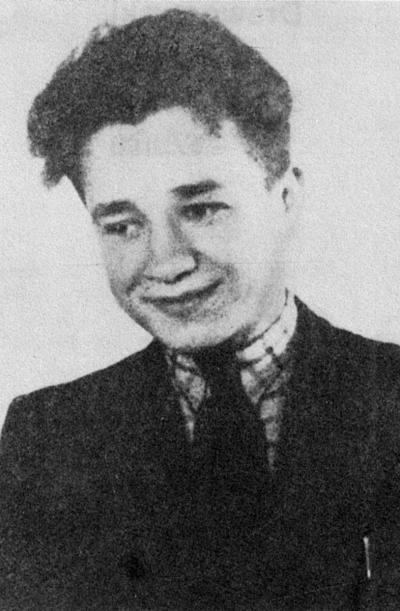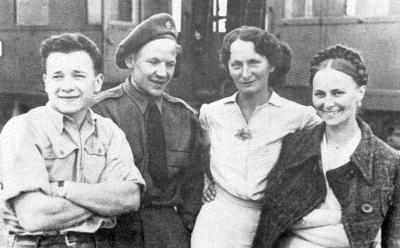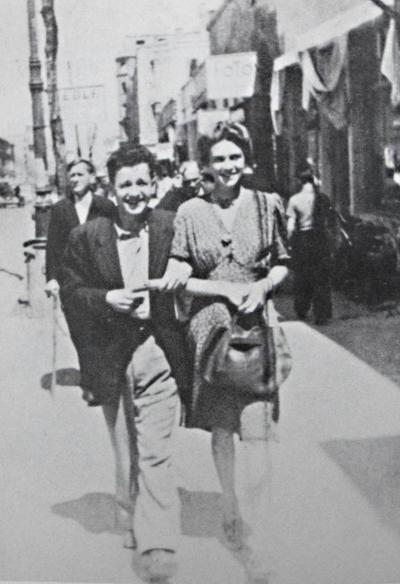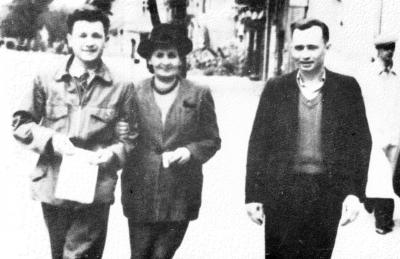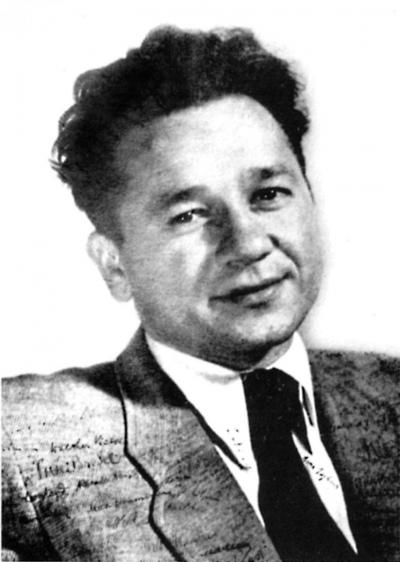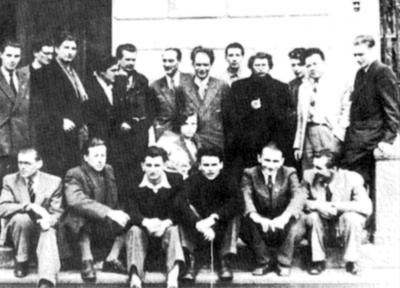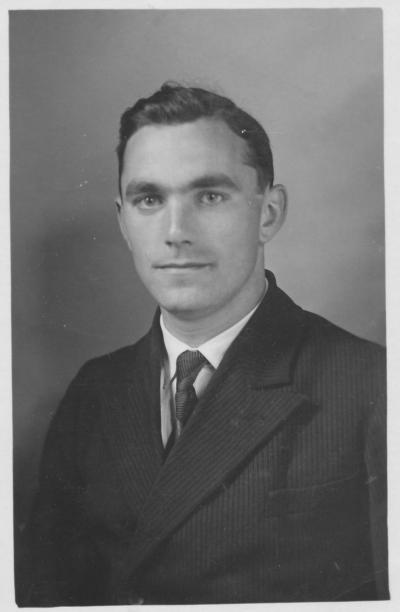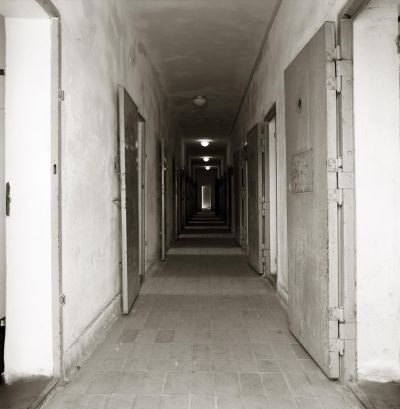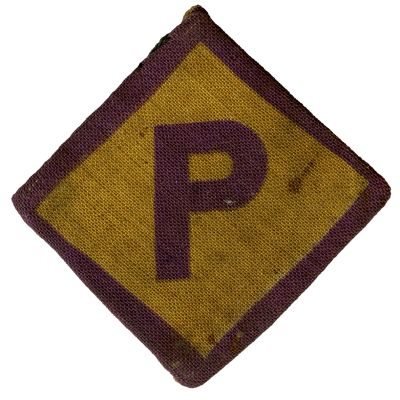Tadeusz Borowski
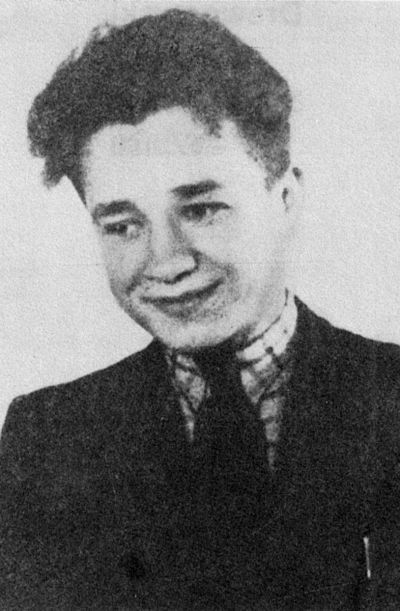
The Road to Dachau
The story of the author’s life in the camps can be divided into two parts. The first is generally better known and is almost automatically associated with Borowski’s work. After a two-month period in the notorious Pawiak prison in Warsaw the young student of Polish (he had studied in the underground university in the city) was moved to the concentration camp in Auschwitz. As the protagonist in At Home in Auschwitz later notes, this only happened when Aryans were no longer gassed there (in spring and summer 1944 Borowski witnessed the annihilation of the Hungarian Jews, the subject of his book People who Went). Much less is known about his time in Germany and his imprisonment in smaller camps on German territory.
Borowski in Germany
In mid-August 1944 Borowski was moved to the Natzweiler concentration camp near Stuttgart. Some months later (at the start of 1945) he arrived in the sub-camp in Dachau-Allach, which was liberated by American troops on 1st May 1945. After that, like many of his fellow sufferers from all over Europe, Borowski was accommodated in a transit camp for so-called displaced persons. He stayed in Freimann, near Munich, until September 1945 (he writes of this time in his Freimann Diary).
In Borowski’s biography of his life in the camps Auschwitz is not the quintessence of mass murder – the periods in the small camps in Germany were the hardest moments in his life. When the Americans arrived the writer was almost dead from weakness. In a letter to Stanisław Marczak-Oborski, dated 7th November 1945, he writes “[…] six months earlier I could hardly stand and weighed just a little over 35 kg.”
After his liberation by the Allies, the author of This Way for the Gas, Ladies and Gentlemen had only one aim in mind: to find his fiancée. After leaving Auschwitz he had received no news of her fate and did not even know where she was living. He found a job co-organising the family search service with the committee of the Polish Red Cross in Munich. There, in early December, he learnt that Maria was living in Sweden (after having been freed from the women’s camp in Ravensbrück). Borowski’s letters to his loved one begged her desperately to return to Poland to join him there. At that point he had not yet decided whether to return himself and wanted to make his decision dependent on Maria:
“At every moment I stand before an open door and can slam it closed at any time. I can simply whistle in the wind and go where I wish. My plans are completely dependent on you. If you refuse to return at any price I shall stay here but if you return I shall follow you immediately. “
The author failed to come to terms with emigration. He yearned for his fatherland, above all for his friends and family. Since he was unable to meet up with his fiancée he was not sure how she felt about him any more. The author of Farewell to Maria therefore decided to tempt fate and return to Poland. He wanted to learn, write, work. He felt that he could no longer study abroad. On 31st May 1946 he was repatriated.
People say Borowski’s experiences in Auschwitz fundamentally influenced his later writings on the system of mass annihilation. However, it was principally it was roughly the two years he spent in Germany that turned him into a prose writer. Borowski’s first works were written during his time in Munich and were only later recognised as part of Polish and world literature on the Holocaust. Between September and December 1945 he joined forces with Janusz Nel-Siedlecki and Krystyn Olszewski to write the short story We were in Auschwitz, that depicted his view of the camp. According to Tadeusz Drewnowski, the highly respected expert on the life and work of Borowski, We were in Auschwitz is a sort of insight: “we try to get a grip on the scope of the crime from the information, memories and tales that reveal the mechanisms in the camp, and portray the largest possible number […] of phenomena typical of Auschwitz.” From then on Borowski attempted to counter this with “a coherent ideal vision… which culminated in the novels and short stories he wrote between 1946 and 1948.”
Borowski’s correspondence during his time in Germany is clear proof that this is what shaped his perspectives on the camps. Here he was hearing, reading and taking notes from other prisoners’ reports. Shortly after leaving Freimann, he heard from a certain Stanisław Wygodzki who had lost his wife and daughter in the Jewish transports between Sosnowitz and Bendzin. The result was This Way for the Gas, Ladies and Gentlemen (it was originally to be called: Transport Sosnowitz-Bendzin). In addition, Borowski also created the character of the overseer, Tadek, – the narrator in his tales – in Munich. True we do not know what Borowski’s character was based on, nor do we know how Borowski saw the relationship between Tadek’s life and his own experiences as a prisoner in Auschwitz. But we do know that all this must have taken place in Munich before the young author of A Day in Harmense returned to Poland.
The letters Borowski wrote in Munich bear witness to the fact that his stories are the result of a virtuoso artistic intuition and an immense intellectual discipline in distilling the core of what happened in the Nazi concentration camps. Borowski’s reality did not correspond to any historical reality. In his search for an appropriate style and intellectual perspective he chose to write in the style of John Steinbeck and Ernest Hemingway, mixing it with irony, elements of the grotesque, contrasts and sarcasm.
The poetry Borowski wrote during his time in Munich no longer contains the universal dimension found in his first published book Wherever the Earth. Now it begins to tell of a concrete time, the here-and-now events in the post-war era. One of its major themes is Germany and the German character: for the poet, German cities, like German landscapes are worthless. They only arouse a wish for revenge – a longing for retribution, and compensation for injustice that fuels his bitterness even more when he thinks that German cities, German landscapes and the Germans themselves never suffered enough destruction. “Even today, sitting here in Munich, I feel utterly outraged that the city scarcely shows any signs of destruction.” The lyrical “I” in Borowski’s Munich poems is full of hatred for everything associated with Germany and German characteristics. The author of This Way for the Gas, Ladies and Gentlemen sees in Germany nothing more than a country full of murderers and sadists. By contrast with his prose works, the poems he wrote in Munich equate Germans with Nazis. His poetry is wilder, more provocative and more aggressive than his prose. It uses contempt, sarcasm and irony more often and more intensively. We might even be given the impression that Brodsky himself is infected with the “ideology of death”.
One of his best-known poems from this time is entitled Evening in Munich. Here the lyrical “I” slips into the role of an avenger. He is obsessed with murdering German men, raping German women and killing German babies. The German city in Evening in Munich is portrayed as a bastion of criminals. Everywhere there is the stench of smoke rising from the crematoria, and the streets are lined with murderers who have evaded punishment. These are the people who were only recently the Masters over life-and-death – beasts in human skin. And now they are playing at being innocent Germans. This is the perspective of the poet – unequivocal and clear.
Liberated but not saved
Borowski’s poetry and prose written during his roughly two-year stay in Germany, can be divided into three main thematic blocks. The first has already been mentioned: his reactions to National Socialism, Germany and German characteristics. The second deals with his attitude to Poland and Polish characteristics. At the centre is a short story entitled The Battle of Grunwald (it was to be the basis for Andrzej Wajda’s major film Landscape after the Battle). In turn The Battle of Grunwald was based on his Freimann Diary and the poetic reportage War’s End.
War’s End was the first work written by Borowski after his liberation. As later, in The Battle of Grunwald, he depicts a nationalist community thrown back into pseudo-religious customs, caught up in conflicts, in 19th-century ways of thinking and in the hope of the rebirth of a united Poland. This is the milieu of ex-soldiers and war veterans. The author of Farewell to Maria had experienced other things – the humiliating camps in which people had been robbed of their humanity. “[Initiated in his poetry and the Battle of Grunwald] Borowski bitterly condemns the growing circles of Polish immigrants, with whom he neither cannot, nor wishes to identify himself and from whom he consciously and consistently distances himself.” The writer rejects pathos. Patriotic ardour is foreign to him. Thus one of his poems begins with the Incipit *** [You are misusing your fatherland for your own ends]. This and the other texts already mentioned, is a cutting satire on the circles of displaced persons. It is a condemnation of the ideology of war veterans, of those who have buried the suffering of individuals in the name of lofty state and nationalist solutions; in the name of abstract ideas.
Borowski’s third main theme from his time in Munich is his view of the post-war world (this problem was already a major theme in his Battle of Grunwald). He was completely unable to share the enthusiasm which gripped the whole of Europe after they realised that the bloodiest of all conflicts had come to an end. The war is still not over in Borowski’s poetry and prose. People continue to die (like Nina in the Battle of Grunwald, who is accidentally shot by an American soldier). The war also continues in the human psyche. Its victims cannot free themselves from it. The survivors cannot return to a normal life because of the memories of the sickening crimes. True, they have saved their bodies from death: nonetheless they have not been able to save their belief in human kindness. The victims, whose survival strategies were to mimic the behaviour of their tormentors, now carry the feelings of shame within them. The camps have broken their spirit. The principles of survival which dictated their behaviour in the Nazi camps now call up pangs of guilt in the free world. In a letter to Maria, Borowski writes: “We are sick persons, you and I. We are suffering from a nebulouos feeling of nostalgia and are tired of the world. But evil is not stuck in the world. It is stuck in us.” Nonetheless there is no accusation against people in Borowski’s prose. It is the system which robs people of their humanity: the charge is first and foremost against the system.
In the Battle of Grunwald and in the poetry he wrote during his time in Munich Borowski attacked the post-war reality in a world that continued to be full of hypocrisy and refused to giving people any real freedom and hope of spiritual transformation. Very little time has passed; but the key values are still being betrayed. Borowski lives in hope of a world built on other ethical and moral bases; on those that will protect people from the return of any system similar to National Socialism. However the protagonist in his Munich poems realises very quickly that the creation of a new order is only fiction, a utopia. And this realisation provokes his resistance.
During his stay in the West Borowski travelled to other parts of Europe, including Paris (“I was there, saw – and am saddened”). In his letters from Munich we recognise a writer who has no more illusions about the moral state of the old continent. His memories of Auschwitz and his picture of the world after liberation do not allow him to believe in the rebirth of Europe and western civilisation: also because the Holocaust has revealed the shocking truth about human nature. Crimes know no boundaries. That said, the particularly frightening knowledge about people is not manifested in the scale of their crimes. It is much more disturbing that mass crimes against people who have been randomly declared to be “worse” are committed in the name of progress and a better world. And in doing so, people made use of the latest advances in technology that should have been used to serve the individual and the progress of civilisation. Thus, Borowski reveals – long before Raul Hilberg and Zygmunt Bauman – a world in which evil is a part of modern civilisation.
***
The fact that Borowski (one of the greatest authors to tell of the Nazi death camps, one of the most significant writers of holocaust literature) laid down the foundations for his magnificent prose works in Germany of all places – in Freimann and Munich in 1945 and 1946 – is astounding. It is almost as if the “journey to Dachau”, to the land of his tormentors, was an essential precondition to his understanding the basis characteristics behind Nazi crimes.
Sławomir Buryła, April 2016
